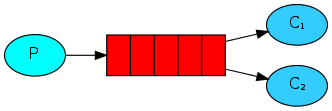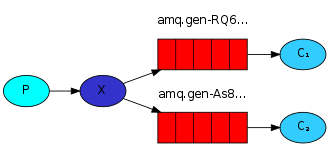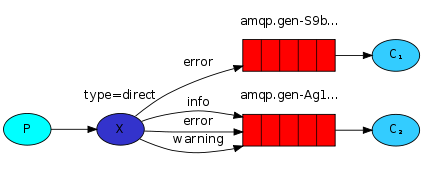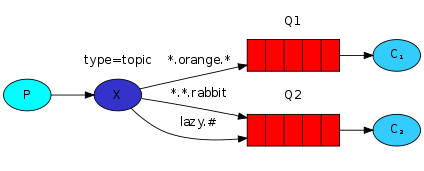- Introduce the RabbitMQ.
- Write some example code.
- Refer the official document.
Introduction
RabbitMQ is a message broker(消息中间件):
- it accepts and forwards messages.
- You can think about it as a post office: when you put the mail that you want posting in a post box, you can be sure that Mr. Postman will eventually deliver the mail to your recipient. In this analogy, RabbitMQ is a post box, a post office and a postman.
- The major difference between RabbitMQ and the post office is that it doesn't deal with paper, instead it accepts, stores and forwards binary blobs of data ‒ messages.
- RabbitMQ, and messaging in general, uses some jargon.
- According to "Hello world in RabbitMQ with Java"
Brief model (Product-Consume-Model)
Producing means nothing more than sending. A program that sends messages is a producer :
Produce
- A queue is the name for a post box which lives inside RabbitMQ. Although messages flow through RabbitMQ and your applications, they can only be stored inside a queue. A queue is only bound by the host's memory & disk limits, it's essentially a large message buffer. Many producers can send messages that go to one queue, and many consumers can try to receive data from one queue. This is how we represent a queue:
// queue_name
口口口口口口口口口口......
// I am sorry about that I am not good at painting :(
Consuming has a similar meaning to receiving. A consumer is a program that mostly waits to receive messages:
Consume
- Note that the producer, consumer, and broker do not have to reside on the same host; indeed in most applications they don't.
Start with "Hello,RabbitMQ"
- In this part of the tutorial we'll write two programs in Java; a producer that sends a single message, and a consumer that receives messages and prints them out. We'll gloss over some of the detail in the Java API, concentrating on this very simple thing just to get started. It's a "Hello World" of messaging.
1. Simple Send And Receive with Named Queue
- SimpleSender.java
package tech.shunzi.mq.demo;
import com.rabbitmq.client.Channel;
import com.rabbitmq.client.Connection;
import com.rabbitmq.client.ConnectionFactory;
import static tech.shunzi.mq.demo.MQConstants.QUEUE_NAME;
public class SimpleSender {
public static void main(String[] argv) throws Exception
{
ConnectionFactory factory = new ConnectionFactory();
// connect to a broker with its name or ip address
factory.setHost("localhost");
Connection connection = factory.newConnection();
// create a channel, which is where most of the API for getting things done resides.
Channel channel = connection.createChannel();
// Declaring a queue is idempotent - it will only be created if it doesn't exist already.
// String queue, boolean durable, boolean exclusive, boolean autoDelete, Map<String, Object> arguments
channel.queueDeclare(QUEUE_NAME, false, false, false, null);
String message = "Hello World!";
// The message content is a byte array, so you can encode whatever you like there.
// String exchange, String routingKey, BasicProperties props, byte[] body
channel.basicPublish("", QUEUE_NAME, null, message.getBytes("UTF-8"));
System.out.println(" [x] Sent '" + message + "'");
channel.close();
connection.close();
}
}
- SimpleReceiver.java
package tech.shunzi.mq.demo;
import com.rabbitmq.client.*;
import java.io.IOException;
import java.io.UnsupportedEncodingException;
import static tech.shunzi.mq.demo.MQConstants.QUEUE_NAME;
public class SimpleReceiver {
public static void main(String[] argv) throws Exception
{
ConnectionFactory factory = new ConnectionFactory();
factory.setHost("localhost");
Connection connection = factory.newConnection();
Channel channel = connection.createChannel();
channel.queueDeclare(QUEUE_NAME, false, false, false, null);
System.out.println(" [*] Waiting for messages. To exit press CTRL+C");
Consumer consumer = new DefaultConsumer(channel)
{
@Override
public void handleDelivery(String consumerTag, Envelope envelope, AMQP.BasicProperties properties, byte[] body) throws IOException, UnsupportedEncodingException {
String message = new String(body, "UTF-8");
System.out.println(" [x] Received '" + message + "'");
}
};
channel.basicConsume(QUEUE_NAME, true, consumer);
}
}
- Key Config: ConnectionFactory, Host, Connection, Channel, Queue
2. Distribute time-consuming tasks among multiple workers
- NewTask.java
package tech.shunzi.mq.demo.multi.consumer;
import com.rabbitmq.client.Channel;
import com.rabbitmq.client.Connection;
import com.rabbitmq.client.ConnectionFactory;
import com.rabbitmq.client.MessageProperties;
public class NewTask {
private static final String TASK_QUEUE_NAME = "task_queue";
public static void main(String[] argv) throws Exception {
ConnectionFactory factory = new ConnectionFactory();
factory.setHost("localhost");
Connection connection = factory.newConnection();
Channel channel = connection.createChannel();
channel.queueDeclare(TASK_QUEUE_NAME, true, false, false, null);
// get the argv from the command line and format e.g.: xxx xxx xxx
String message = getMessage(argv);
// MessageProperties.PERSISTENT_TEXT_PLAIN can make sure message persistent
// Marking messages as persistent doesn't fully guarantee that a message won't be lost.
channel.basicPublish("", TASK_QUEUE_NAME, MessageProperties.PERSISTENT_TEXT_PLAIN, message.getBytes("UTF-8"));
System.out.println(" [x] Sent '" + message + "'");
channel.close();
connection.close();
}
private static String getMessage(String[] strings) {
if (strings.length < 1) {
return "Hello World!";
}
return joinStrings(strings, " ");
}
private static String joinStrings(String[] strings, String delimiter) {
int length = strings.length;
if (length == 0)
return "";
StringBuilder words = new StringBuilder(strings[0]);
for (int i = 1; i < length; i++) {
words.append(delimiter).append(strings[i]);
}
return words.toString();
}
}
- Worker.java
package tech.shunzi.mq.demo.multi.consumer;
import com.rabbitmq.client.*;
import java.io.IOException;
public class Worker {
private static final String TASK_QUEUE_NAME = "task_queue";
public static void main(String[] argv) throws Exception {
ConnectionFactory factory = new ConnectionFactory();
factory.setHost("localhost");
final Connection connection = factory.newConnection();
final Channel channel = connection.createChannel();
// make the queue durable. true
channel.queueDeclare(TASK_QUEUE_NAME, true, false, false, null);
System.out.println(" [*] Waiting for messages. To exit press CTRL+C");
// producer can only send a message to a consumer. balanced load
channel.basicQos(1);
final Consumer consumer = new DefaultConsumer(channel) {
@Override
public void handleDelivery(String consumerTag, Envelope envelope, AMQP.BasicProperties properties, byte[] body) throws IOException {
String message = new String(body, "UTF-8");
System.out.println(" [x] Received '" + message + "'");
try {
// simulate a task which cost some time.
doWork(message);
} finally {
System.out.println(" [x] Done");
// false means need ack to verify.
channel.basicAck(envelope.getDeliveryTag(), false);
}
}
};
channel.basicConsume(TASK_QUEUE_NAME, false, consumer);
}
private static void doWork(String task) {
for (char ch : task.toCharArray()) {
if (ch == '.') {
try {
Thread.sleep(1000);
} catch (InterruptedException _ignored) {
Thread.currentThread().interrupt();
}
}
}
}
}
- Some key functions details: interface Channel.java
/**
* Declare a queue
* @see com.rabbitmq.client.AMQP.Queue.Declare
* @see com.rabbitmq.client.AMQP.Queue.DeclareOk
* @param queue the name of the queue
* @param durable true if we are declaring a durable queue (the queue will survive a server restart)
* @param exclusive true if we are declaring an exclusive queue (restricted to this connection)
* @param autoDelete true if we are declaring an autodelete queue (server will delete it when no longer in use)
* @param arguments other properties (construction arguments) for the queue
* @return a declaration-confirm method to indicate the queue was successfully declared
* @throws java.io.IOException if an error is encountered
*/
Queue.DeclareOk queueDeclare(String queue, boolean durable, boolean exclusive, boolean autoDelete,
Map<String, Object> arguments) throws IOException;
/**
* Publish a message.
*
* Publishing to a non-existent exchange will result in a channel-level
* protocol exception, which closes the channel.
*
* Invocations of <code>Channel#basicPublish</code> will eventually block if a
* <a href="http://www.rabbitmq.com/alarms.html">resource-driven alarm</a> is in effect.
*
* @see com.rabbitmq.client.AMQP.Basic.Publish
* @see <a href="http://www.rabbitmq.com/alarms.html">Resource-driven alarms</a>
* @param exchange the exchange to publish the message to
* @param routingKey the routing key
* @param props other properties for the message - routing headers etc
* @param body the message body
* @throws java.io.IOException if an error is encountered
*/
void basicPublish(String exchange, String routingKey, BasicProperties props, byte[] body) throws IOException;
/**
* Request a specific prefetchCount "quality of service" settings
* for this channel.
*
* @see #basicQos(int, int, boolean)
* @param prefetchCount maximum number of messages that the server
* will deliver, 0 if unlimited
* @throws java.io.IOException if an error is encountered
*/
void basicQos(int prefetchCount) throws IOException;
/**
* Acknowledge one or several received
* messages. Supply the deliveryTag from the {@link com.rabbitmq.client.AMQP.Basic.GetOk}
* or {@link com.rabbitmq.client.AMQP.Basic.Deliver} method
* containing the received message being acknowledged.
* @see com.rabbitmq.client.AMQP.Basic.Ack
* @param deliveryTag the tag from the received {@link com.rabbitmq.client.AMQP.Basic.GetOk} or {@link com.rabbitmq.client.AMQP.Basic.Deliver}
* @param multiple true to acknowledge all messages up to and
* including the supplied delivery tag; false to acknowledge just
* the supplied delivery tag.
* @throws java.io.IOException if an error is encountered
*/
void basicAck(long deliveryTag, boolean multiple) throws IOException;
/**
* Start a non-nolocal, non-exclusive consumer, with
* a server-generated consumerTag.
* @param queue the name of the queue
* @param autoAck true if the server should consider messages
* acknowledged once delivered; false if the server should expect
* explicit acknowledgements
* @param callback an interface to the consumer object
* @return the consumerTag generated by the server
* @throws java.io.IOException if an error is encountered
* @see com.rabbitmq.client.AMQP.Basic.Consume
* @see com.rabbitmq.client.AMQP.Basic.ConsumeOk
* @see #basicConsume(String, boolean, String, boolean, boolean, Map, Consumer)
*/
String basicConsume(String queue, boolean autoAck, Consumer callback) throws IOException;
- autoAck:
true- The msg will be acknowledged once deliveredfalse- The server expects explicit acknowledgements. (It means that manual ack publish is necessary.basicAck())
- durable: (Producer & Consumer Both Config this)
true- To make sure that RabbitMQ will never lose our queue. And it only makes sense when first create/setup.
- BasicProperties props :
MessageProperties.PERSISTENT_TEXT_PLAIN- Make sure the message persistent. Attention: The persistence guarantees aren't strong, but it's more than enough for our simple task queue. One situation is that message is stored in cache and hasn't be stored on disk.
- prefetchCount: maximum number of messages that the server will deliver
1- This tells RabbitMQ not to give more than one message to a worker at a time. Or, in other words, don't dispatch a new message to a worker until it has processed and acknowledged the previous one. Instead, it will dispatch it to the next worker that is not still busy.- ...
Publish/Subscribe
Introduction
In this part we'll do something completely different -- we'll deliver a message to multiple consumers. This pattern is known as "publish/subscribe".
To illustrate the pattern, we're going to build a simple logging system. It will consist of two programs -- the first will emit log messages and the second will receive and print them. And there will be many receivers to receive the messages.
Full Message Model in Rabbit
Previous model
- A producer is a user application that sends messages.
- A queue is a buffer that stores messages.
- A consumer is a user application that receives messages.

Problems existed:
- The core idea in the messaging model in RabbitMQ is that the producer never sends any messages directly to a queue. Actually, quite often the producer doesn't even know if a message will be delivered to any queue at all.
- There may be a lot of queues. And one producer may send msg to many queues. Duplicate code is bad practice.
New Model

- Exchange : An exchange is a very simple thing. On one side it receives messages from producers and the other side it pushes them to queues. The exchange must know exactly what to do with a message it receives.
- Direct : Same routing key.(Same string)
- Topic : Same string pattern of routing key.(eg.
*.*.#,lazy.orange.rabbit) - Headers : Ignore the routing key and match header attributes.
- Fanout : Ignore routing key.(Broadcast to all queues)
Example of Fanout Exchange
- Publisher
package tech.shunzi.mq.demo.publish;
import com.rabbitmq.client.BuiltinExchangeType;
import com.rabbitmq.client.Channel;
import com.rabbitmq.client.Connection;
import com.rabbitmq.client.ConnectionFactory;
public class EmitLog {
private static final String EXCHANGE_NAME = "logs";
public static void main(String[] argv) throws Exception {
ConnectionFactory factory = new ConnectionFactory();
factory.setHost("localhost");
Connection connection = factory.newConnection();
Channel channel = connection.createChannel();
// Actively declare a non-autodelete, non-durable exchange with no extra arguments
// Declare an FANOUT exchange with name "logs"
channel.exchangeDeclare(EXCHANGE_NAME, BuiltinExchangeType.FANOUT);
String message = getMessage(argv);
// Publishing to a non-existent exchange named "log"
channel.basicPublish(EXCHANGE_NAME, "", null, message.getBytes("UTF-8"));
System.out.println(" [x] Sent '" + message + "'");
channel.close();
connection.close();
}
private static String getMessage(String[] strings) {
if (strings.length < 1) {
return "info: Hello World!";
}
return joinStrings(strings, " ");
}
private static String joinStrings(String[] strings, String delimiter) {
int length = strings.length;
if (length == 0) {
return "";
}
StringBuilder words = new StringBuilder(strings[0]);
for (int i = 1; i < length; i++) {
words.append(delimiter).append(strings[i]);
}
return words.toString();
}
}
- Consumer
package tech.shunzi.mq.demo.publish;
import com.rabbitmq.client.*;
import java.io.IOException;
public class ReceiveLogs {
private static final String EXCHANGE_NAME = "logs";
public static void main(String[] argv) throws Exception {
ConnectionFactory factory = new ConnectionFactory();
factory.setHost("localhost");
Connection connection = factory.newConnection();
Channel channel = connection.createChannel();
// Actively declare a non-auto-delete, non-durable exchange with no extra arguments
// Declare an FANOUT exchange with name "logs"
channel.exchangeDeclare(EXCHANGE_NAME, BuiltinExchangeType.FANOUT);
// Create a non-durable, exclusive, auto-delete queue with a generated name
String queueName = channel.queueDeclare().getQueue();
// Bind the queues to the exchange, maintain the binding relationship between queues and exchange.
// The FANOUT exchange will ignore the routing-key value.
channel.queueBind(queueName, EXCHANGE_NAME, "");
System.out.println(" [*] Waiting for messages. To exit press CTRL+C");
Consumer consumer = new DefaultConsumer(channel) {
@Override
public void handleDelivery(String consumerTag, Envelope envelope,
AMQP.BasicProperties properties, byte[] body) throws IOException {
String message = new String(body, "UTF-8");
System.out.println(" [x] Received '" + message + "'");
}
};
channel.basicConsume(queueName, true, consumer);
}
}
Example of Direct Exchange
- We will use a direct exchange instead. The routing algorithm behind a direct exchange is simple - a message goes to the queues whose binding key exactly matches the routing key of the message.

-
If the routing keys are the same as other queues, it will behave like FANOUT exchange.
-
Producer
package tech.shunzi.mq.demo.exchange.direct;
import com.rabbitmq.client.BuiltinExchangeType;
import com.rabbitmq.client.Channel;
import com.rabbitmq.client.Connection;
import com.rabbitmq.client.ConnectionFactory;
public class EmitLogDirect {
private static final String EXCHANGE_NAME = "direct_logs";
public static void main(String[] argv) throws Exception {
ConnectionFactory factory = new ConnectionFactory();
factory.setHost("localhost");
Connection connection = factory.newConnection();
Channel channel = connection.createChannel();
// Actively declare a non-auto-delete, non-durable exchange with no extra arguments
// Declare an Direct exchange with name "direct_logs"
channel.exchangeDeclare(EXCHANGE_NAME, BuiltinExchangeType.DIRECT);
// Declare routing key name
String severity = getSeverity(argv);
String message = getMessage(argv);
channel.basicPublish(EXCHANGE_NAME, severity, null, message.getBytes("UTF-8"));
System.out.println(" [x] Sent '" + severity + "':'" + message + "'");
channel.close();
connection.close();
}
private static String getSeverity(String[] strings) {
if (strings.length < 1) {
return "info";
}
return strings[0];
}
private static String getMessage(String[] strings) {
if (strings.length < 2) {
return "Hello World!";
}
return joinStrings(strings, " ", 1);
}
private static String joinStrings(String[] strings, String delimiter, int startIndex) {
int length = strings.length;
if (length == 0) {
return "";
}
if (length < startIndex) {
return "";
}
StringBuilder words = new StringBuilder(strings[startIndex]);
for (int i = startIndex + 1; i < length; i++) {
words.append(delimiter).append(strings[i]);
}
return words.toString();
}
}
- Consumer
package tech.shunzi.mq.demo.exchange.direct;
import com.rabbitmq.client.*;
import java.io.IOException;
public class ReceiveLogsDirect {
private static final String EXCHANGE_NAME = "direct_logs";
public static void main(String[] argv) throws Exception {
ConnectionFactory factory = new ConnectionFactory();
factory.setHost("localhost");
Connection connection = factory.newConnection();
Channel channel = connection.createChannel();
// Actively declare a non-auto-delete, non-durable exchange with no extra arguments
// Declare an Direct exchange with name "direct_logs"
channel.exchangeDeclare(EXCHANGE_NAME, BuiltinExchangeType.DIRECT);
// Create a non-durable, exclusive, auto-delete queue with a generated name
String queueName = channel.queueDeclare().getQueue();
if (argv.length < 1){
System.err.println("Usage: ReceiveLogsDirect [info] [warning] [error]");
System.exit(1);
}
for(String severity : argv){
// Bind the queues to the exchange
// Maintain the binding relationship between queues and exchange with given routing key name.
channel.queueBind(queueName, EXCHANGE_NAME, severity);
}
System.out.println(" [*] Waiting for messages. To exit press CTRL+C");
Consumer consumer = new DefaultConsumer(channel) {
@Override
public void handleDelivery(String consumerTag, Envelope envelope,
AMQP.BasicProperties properties, byte[] body) throws IOException {
String message = new String(body, "UTF-8");
System.out.println(" [x] Received '" + envelope.getRoutingKey() + "':'" + message + "'");
}
};
channel.basicConsume(queueName, true, consumer);
}
}
Example of Topic Exchange
*(star) can substitute for exactly one word.#(hash) can substitute for zero or more words.

- Producer
package tech.shunzi.mq.demo.exchange.topic;
import com.rabbitmq.client.BuiltinExchangeType;
import com.rabbitmq.client.Channel;
import com.rabbitmq.client.Connection;
import com.rabbitmq.client.ConnectionFactory;
public class EmitLogTopic {
private static final String EXCHANGE_NAME = "topic_logs";
public static void main(String[] argv) {
Connection connection = null;
Channel channel = null;
try {
ConnectionFactory factory = new ConnectionFactory();
factory.setHost("localhost");
connection = factory.newConnection();
channel = connection.createChannel();
channel.exchangeDeclare(EXCHANGE_NAME, BuiltinExchangeType.TOPIC);
String routingKey = getRouting(argv);
String message = getMessage(argv);
channel.basicPublish(EXCHANGE_NAME, routingKey, null, message.getBytes("UTF-8"));
System.out.println(" [x] Sent '" + routingKey + "':'" + message + "'");
} catch (Exception e) {
e.printStackTrace();
} finally {
if (connection != null) {
try {
connection.close();
} catch (Exception ignore) {
}
}
}
}
private static String getRouting(String[] strings) {
if (strings.length < 1) {
return "anonymous.info";
}
return strings[0];
}
private static String getMessage(String[] strings) {
if (strings.length < 2) {
return "Hello World!";
}
return joinStrings(strings, " ", 1);
}
private static String joinStrings(String[] strings, String delimiter, int startIndex) {
int length = strings.length;
if (length == 0) {
return "";
}
if (length < startIndex) {
return "";
}
StringBuilder words = new StringBuilder(strings[startIndex]);
for (int i = startIndex + 1; i < length; i++) {
words.append(delimiter).append(strings[i]);
}
return words.toString();
}
}
- Consumer
package tech.shunzi.mq.demo.exchange.topic;
import com.rabbitmq.client.*;
import java.io.IOException;
public class ReceiveLogsTopic {
private static final String EXCHANGE_NAME = "topic_logs";
public static void main(String[] argv) throws Exception {
ConnectionFactory factory = new ConnectionFactory();
factory.setHost("localhost");
Connection connection = factory.newConnection();
Channel channel = connection.createChannel();
channel.exchangeDeclare(EXCHANGE_NAME, BuiltinExchangeType.TOPIC);
String queueName = channel.queueDeclare().getQueue();
if (argv.length < 1) {
System.err.println("Usage: ReceiveLogsTopic [binding_key]...");
System.exit(1);
}
for (String bindingKey : argv) {
channel.queueBind(queueName, EXCHANGE_NAME, bindingKey);
}
System.out.println(" [*] Waiting for messages. To exit press CTRL+C");
Consumer consumer = new DefaultConsumer(channel) {
@Override
public void handleDelivery(String consumerTag, Envelope envelope,
AMQP.BasicProperties properties, byte[] body) throws IOException {
String message = new String(body, "UTF-8");
System.out.println(" [x] Received '" + envelope.getRoutingKey() + "':'" + message + "'");
}
};
channel.basicConsume(queueName, true, consumer);
}
}
Relationship between Different Exchange
- When a queue is bound with
"#"(hash) binding key - it will receive all the messages, regardless of the routing key - like in fanout exchange. - When special characters
"*"(star) and"#"(hash) aren't used in bindings, the topic exchange will behave just like a direct one.
Header Exchange
- Refer link : [CSDN Blog: Topic Exchange of Rabbit MQ]
RPC system with Rabbit MQ
- Refer link: [Jianshu: RabbitMQ Tutorial Six]
